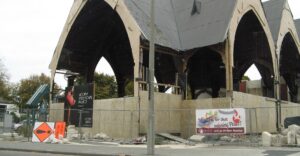
The PCC EWD 2024 Future Of Work Conference – Part 3: The Panel Discussion
The nexus of sports, media, and entertainment was at the heart of the conversation during the 6th Annual Future of Work Conference (FOW) hosted by Pasadena City College on October 29th. Three notable public figures (Assemblyman Mike Fong, PCC President/Superintendent Jose Gomez, and LAEDC President Stephen Cheung) and two thrilling keynote speakers (Julie Urhman of the Angel City Football Club and Jasmine Star, business strategist) shared their insights on how sports have impacted their lives and careers.
The real convo, however, was among the four panelists, each of whom presented a unique and fresh perspective from their own personal and professional journeys. As a collection of individual commentaries, the discussion was fascinating. As a panel as a whole, the symposium was comprehensive in its scope.
The Topic:
Championing Careers: Workforce Development at the Intersection of Sports and Entertainment
A sport is not just a game; it’s many games, and how they’re being played is changing. Today’s professional and amateur sports environment hosts billions of fans across hundreds of thousands of sports, leagues, and players. All that sweat adds up to big business, and each of the panelists is invested in that business in one way or another:
- Monique Reaves, Chief Revenue Officer of the Rose Bowl Stadium
Ms. Reaves has spent her life in the sports and entertainment industries. As a member of the LA Tourism & Convention Board and the Women in Sports and Events Inc. organization, she’s experienced first-hand how sports impact communities and how women impact sports.
- Liliana T. Perez-Palacios, Sr. Director of Cultural Affairs, Los Angeles Chargers
Ms. Perez-Palacios spent years in Southern California’s political system, managing protocols, communications, and outreach for several administrations. The Los Angeles Chargers are the beneficiary of her expertise; in her Cultural Affairs Director role, she acts as the nexus between the team and LA’s diverse and sports-mad populations.
- Matt Cacciato, President, LA Sports Council
As a trade association, the LA Sports Council focuses on sports and sporting inclusion and innovation to positively impact the community. In his role as President, Cacciato brings his years of academic excellence in sports administration to drive the agency’s strategies and practices.
Every sports team also is a business or does business with its community. Dr. Cummo’s workforce development focus ensures that LA-based sporting companies and industries have the staff they need to meet fan demands and excel in their market.
The Questions:
Individually, the perspectives of this quad of industry, culture, business, and academic experts were informative and insightful. Together, their responses to questions from moderator Stephen Cheung (President – LA Economic Development Corporation) expanded the conversation into a genuinely all-encompassing treatise on how entertainment, sports, and media function as a whole sector in and of itself.
How do we create a triple-value bottom line – profit, community, environment – by building a sports-focused workforce?
The uniform answer from all was, “Bring your best game, whatever that might be.”
- Perez-Palacios noted that ‘diversity’ is an industry driver. Every person offers unique skills and talents as a workforce member, regardless of their color, ethnicity, etc. Agencies that embrace the diversity of their staff – and fandom! – will grow more quickly and broadly than those that limit their potential candidates.
- Reaves noted that women are becoming more involved with organized sports at all levels. Women’s sports teams are emerging in many communities, and as many as 75% of all women identify as sports fans. Harnessing that energy can only benefit the triad of sporting industries as a group.
- Cacciato clarified how ‘sports,’ as a trade industry, opens doors to many non-game opportunities. The presentation of LA’s 2028 Summer Olympics, for example, is a collaboration of many sectors: entertainment (of course), but also transportation, hospitality, venue management, etc. Every element that supports game playing but isn’t specifically involved with the game or sport itself will need staffing and oversight by non-athletes.
- Cummo discussed the physical impact of sports and sporting events on their environment, noting that sports organizers are addressing sustainability and green energy initiatives as well as athletics. Building these green standards into LA’s sporting sector will generate thousands of jobs needing thousands of well-trained and skilled workers.
How does your organization connect with potential sports industry workforce candidates?
Across the board, the answer was, “Go find them!”
- Cacciato reported that every game, regardless of its type or caliber, typically has spectators, even if it’s just people stopping to watch during their nightly stroll. There can be job opportunities available for those folks if they are informed about them.
- Reaves shared that companies that have already hired for sports-based events will almost certainly be hiring again for future events. People looking to enter the sector can start as a parking attendant or in crowd control to get a flavor of the work and a foot in the door.
- Perez-Palacios suggests that social media channels can be helpful for potential candidates. Folks who respond to or engage with team-related email blasts and Facebook posts are often open to exploring a more significant role with their favorite team or player.
- Cummo encouraged the panelists and audience to engage directly with the schools teaching relevant courses. California’s Community College Career Centers are conduits between employers and employees; those resources always benefit from industry professionals contributing to educational processes.
Other workforce-related suggestions were made:
- Volunteer opportunities at many levels of a sporting operation often provide the open door through which paid employment becomes possible.
- There are jobs beyond the foundational ‘sporting event’ occupations that require specialization, too. Finance, media, healthcare, and even mental health professionals can all contribute to an athletic team’s success.
- The panelists also noted LA’s high profile in the sporting world. With Orange County teams included, the region is home to 13 professional sports teams, all of which have both resources and needs. Connect with all of them to expand opportunities for workers and the enterprise.
The panel discussion was an invaluable resource for Conference attendees to clarify how ‘sports,’ as an individual industry, can influence and drive growth in several ancillary sectors. Those who can’t play on the actual field can still have a personal and lucrative role in the game.


